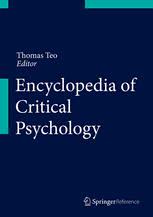
Encyclopedia of Critical Psychology PDF
Preview Encyclopedia of Critical Psychology
Thomas Teo Editor Encyclopedia of Critical Psychology 1 3 Reference Encyclopedia of Critical Psychology Thomas Teo Editor Encyclopedia of Critical Psychology With13Figuresand2Tables Editor ThomasTeo DepartmentofPsychology YorkUniversity Toronto,ON,Canada ISBN978-1-4614-5582-0 ISBN978-1-4614-5583-7(eBook) ISBN978-1-4614-5584-4(printandelectronicbundle) DOI10.1007/978-1-4614-5583-7 SpringerNewYorkHeidelbergDordrechtLondon LibraryofCongressControlNumber:2014931655 #SpringerScience+BusinessMediaNewYork2014 Thisworkissubjecttocopyright.AllrightsarereservedbythePublisher,whetherthewholeor part of the material is concerned, specifically the rights of translation, reprinting, reuse of illustrations,recitation,broadcasting,reproductiononmicrofilmsorinanyotherphysicalway, andtransmissionorinformationstorageandretrieval,electronicadaptation,computersoftware, orbysimilarordissimilarmethodologynowknownorhereafterdeveloped.Exemptedfromthis legalreservationarebriefexcerptsinconnectionwithreviewsorscholarlyanalysisormaterial suppliedspecificallyforthepurposeofbeingenteredandexecutedonacomputersystem,for exclusiveusebythepurchaserofthework.Duplicationofthispublicationorpartsthereofis permitted only under the provisions of the Copyright Law of the Publisher’s location, in its currentversion,andpermissionforusemustalwaysbeobtainedfromSpringer.Permissionsfor usemaybeobtainedthroughRightsLinkattheCopyrightClearanceCenter.Violationsareliable toprosecutionundertherespectiveCopyrightLaw. Theuseofgeneraldescriptivenames,registerednames,trademarks,servicemarks,etc.inthis publicationdoesnotimply,evenintheabsenceofaspecificstatement,thatsuchnamesare exemptfromtherelevantprotectivelawsandregulationsandthereforefreeforgeneraluse. Whiletheadviceandinformationinthisbookarebelievedtobetrueandaccurateatthedateof publication, neither the authors nor the editors nor the publisher can accept any legal responsibilityforanyerrorsoromissionsthatmaybemade.Thepublishermakesnowarranty, expressorimplied,withrespecttothematerialcontainedherein. Printedonacid-freepaper SpringerispartofSpringerScience+BusinessMedia(www.springer.com) ... mit dem kategorischen Imperativ, alle Verha€ltnisse umzuwerfen, in denen der Mensch ein erniedrigtes, ein geknechtetes, ein verlassenes, ein vera€chtliches Wesen ist ... Preface No perspicuous definition of critical psychology currently exists. For some psychologists, critical psychology is about analyzing psychology in the context of power, including the power that psychology, as a discipline and as a practice, exerts in the process of subjectification. For others, critical psychology is about acknowledging and analyzing the embeddedness of human mental life or subjectivity, and their conceptualizations, in larger structures such as society, history, or culture. Still others have argued that criticalpsychologyisprincipallyapracticeorthatpsychologistsshouldgive primacytopraxisovertheory,wherebythetermisunderstoodinthecontext of emancipation, liberation, or resistance. Some have argued that critical psychologyisaboutdeconstructingmainstreampsychologywhileproviding new and better alternative concepts, theories, and practices. Again, others have argued that critical psychology, as a human science and profession, should be guided specifically by the values of social justice, equality, solidarity, and liberty. Some have even argued that critical psychology is aboutdecolonizingtraditionalpsychologyandchallengingthestatusquo. Idonotevenattempttoprovideaconclusivedefinitionofcriticalpsychol- ogy,butwouldrathersuggestthatanencyclopediaofcriticalpsychologyneeds tocastanetaswideaspossiblearoundwhatcriticallypsychologymayentail. Indeed, the entries in this encyclopedia are a testimony to the variety of understandingsofwhatcriticalcouldmean.Representedhereareapproaches that include phenomenology and hermeneutics, Marxism, feminism, social constructionism, anti-psychiatry, anarchism, critical theory, chaos theory, critical race and disability theory, queer theory, radical community psychol- ogy, psychoanalysis, poststructuralism, postcolonial theory, and other non-mainstream approaches. As it is often the case with approaches whose identitiesaremarginalandhybrid,Iamcertainthatsomecriticalpsychologists wouldhavelikedtoexcludeorre-writeothercriticalpsychologists’entries,or tohaveseenadditionalentries.Certainly,suchexclusionaryandinclusionary intentions emerge from this heterogeneous area that we call critical psychology. Tothebestofmyknowledge,theEncyclopediaofCriticalPsychologyis the first English-language encyclopedia that focuses on concepts, theories, andpracticesthatreflectvariouscriticaltraditionswhileprovidinganalytical evaluations of traditional as well as critical ideas. The structure of the encyclopedia reflects this notion when traditional and critical debates on aspecificsubjectmatterortopicarecomparedandcontrasted.Longerentries vii viii Preface intheworkincludethehistoryaswellasthemeaningofapsychologicalterm in an international and practical context. Reflection on the meaning or relevance of a term in a global context forces the author, and the reader, to move beyond their own theoretical-geographical borders. Ibelieve that this requirement, to reach beyond one’s own frameworks, was a difficult one to fulfil for some authors. Equally difficult was it for theory-oriented critical psychologiststoreflectonthemeaningoftheiranalysesforpraxis,eveninits widestmeaning. This ground-breaking encyclopedia, which has attempted to include a range of critical traditions, geographical regions, and as many relevant termsaspossible,couldhoweverbeimprovedinmultipleways.Forinstance, language remains an important barrier for a wide variety of international contributions, and English-speaking authors were thus privileged. Doing perfect justice toall the problems that we encountered when committing to theinternationalizationof(critical)psychology,aswellastothevarietiesof critical psychology and to the vast array of terms that demand critical assessment, would have required more time and space. I hope we will be abletoremedysuchlacunaeinfutureeditions,butIbelievethatthepresent editionwillbehelpfultopsychologistsaswellashumanandsocialscientists more broadly. Indeed, the encyclopedia provides a systematic voice for criticalpsychologistsfromaroundtheworldwhenlookingcomprehensively atpsychologicaltopicsfromcriticalpointsofview. Finally, I should mention that it was challenging to commit authors to followapre-arrangedstructure,whichwasintendedtoprovidecoherenceand improve readability for students and academics alike. The very nature of criticalpsychologyasachallengetothestatusquowasturnedagainsttheidea ofproducingastructureddiscussionofpsychologicalterms.Suchanintuitive reaction, sometimes justified through reason, required coaching and appeals to solidarity to overcome. Still, some entries did not follow the structure completely. I do not necessarily consider this a weakness but a reality that reflects the complexity and variety of critical thinking and criticalpersonalitiesinpsychology. December2013 ThomasTeo Toronto,ON,Canada Acknowledgments IwouldliketothankthefollowingprojectmanagersatYorkUniversity,and particularlyZhipengGao,withoutwhoseactivemanagementandleadership thisprojectwouldnothavebeenpossible: MarissaE.Barnes PatricPlesa YorkUniversity YorkUniversity Toronto,ON Toronto,ON Canada Canada ZhipengGao RahaSheivari YorkUniversity YorkUniversity Toronto,ON Toronto,ON Canada Canada MathisKaiser BenZabinski UniversityofKonstanz YorkUniversity Konstanz Toronto,ON Germany Canada Iwouldalsoliketoexpressmysincereappreciationforthespecialcontribu- tionsofthefollowingacademicstowardthepublicationofthistitle: JacobA.Belzen Anne-NellyPerret-Clermont UniversityofAmsterdam InstituteofPsychologyand Amsterdam Education TheNetherlands FacultyofHumanities LucianoMecacci UniversityofNeuchaˆtel Neuchaˆtel DepartmentofPsychology Switzerland UniversityofFlorence Firenze PaulStenner Italy DepartmentofPsychology ChinaMills FacultyofSocialSciences OxfordPovertyandHuman TheOpenUniversity DevelopmentInitiative(OPHI) MiltonKeynes OxfordDepartmentofInternational UK Development UniversityofOxford Oxford UK ix
